Liz Truss’ likely cabinet: The good, the bad and the terrifying for LGBTQ+ rights
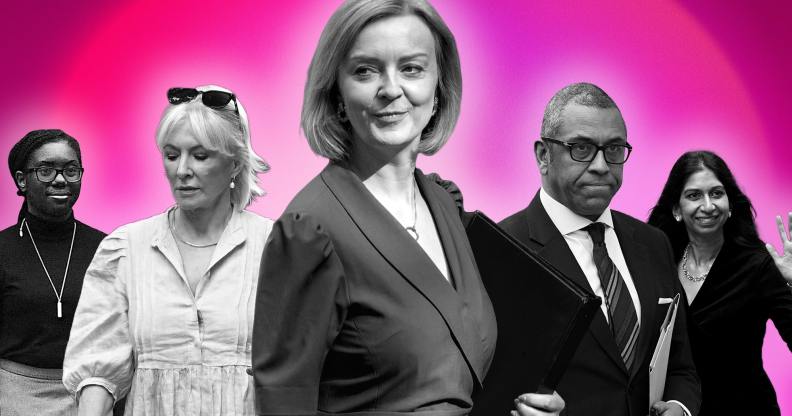
Liz Truss’ likely cabinet. (Getty)
After Liz Truss’ victory in the Tory leadership race, we look at her likely new cabinet and their stances on LGBTQ+ rights.
Truss was confirmed as Britain’s next prime minister on Monday (5 September), and will take office after visiting the Queen in Balmoral on Tuesday (6 September).
Immediately, she will set about installing a team of allies around her, who collectively will shape Britain’s path on everything from education and finances to equality and human rights.
It’s been widely predicted that Liz Truss’ cabinet will include current business secretary Kwasi Kwarteng as chancellor and former leadership rival Suella Braverman as home secretary.
The current ministers in those roles – Nadhim Zahawi and Priti Patel, could offered lesser offices – whether they would accept demotions remains unclear.
There won’t be a job for Rishi Sunak, it’s thought. However Kemi Badenoch, who also vied for the leadership and was an equalities minister under Truss, is tipped for a big promotion, with work and pensions secretary Thérèse Coffey also being eyed for a key role.
Ahead of the official announcement, we take a look at the likely candidates for Liz Truss’ cabinet and scrutinise their LGBTQ+ records.
Suella Braverman
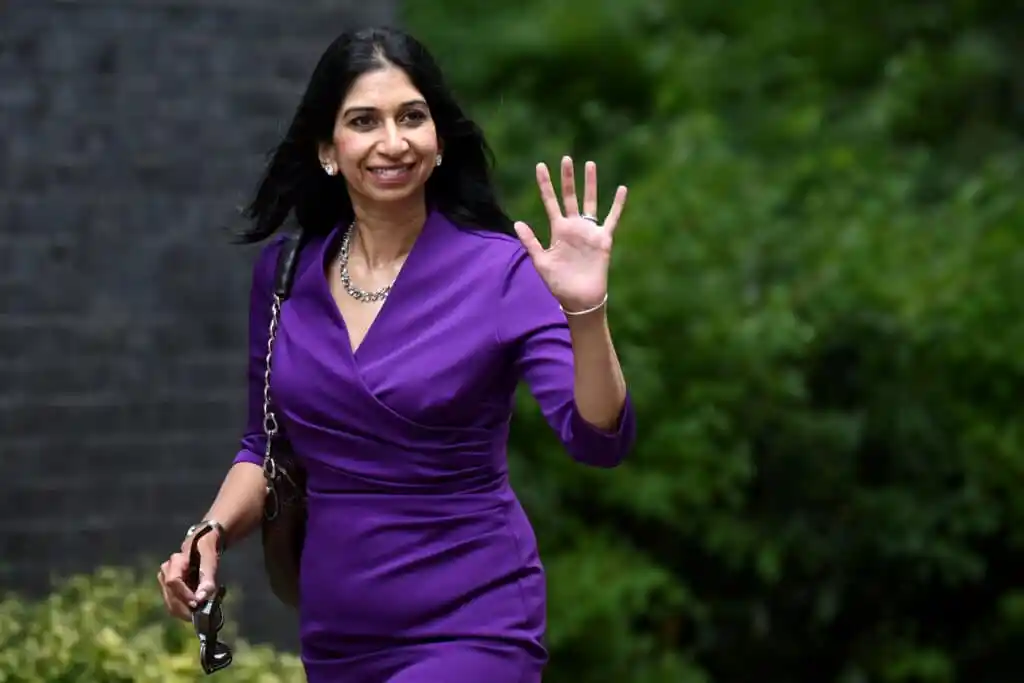
Suella Braverman wants schools to be able to misgender trans kids. (Leon Neal/Getty Images)
Attorney general Suella Braverman made a short-lived bid for the Tory leadership, with a campaign rooted firmly in “war on woke” rhetoric.
She announced her bid with an anti-trans dogwhistle, claiming: “We need to get rid of all of this woke rubbish and get back to a country where describing a man and a woman in terms of biology does not mean that you’re going to lose your job.”
While anti-trans talking points became a defining part of the Tory leadership race, Braverman didn’t simply pick up this rhetoric to win votes. Even before Johnson’s downfall, she was making headlines for suggesting Westminster could block Scotland’s vital and long-promised reform of the Gender Recognition Act, which would make it easier for trans people to get a Gender Recognition Certificate.
Since she was knocked out of the race, her profile heightened, she has continued this line of politics. In a speech in August, she attacked LGBTQ-inclusive education, saying schools should not be teaching kids “keywords” about the LGBTQ+ community or affirming trans identities.
She also told The Times that teachers have no legal requirement to support trans and non-binary pupils by letting them use the toilets or wear school uniform that aligns with their gender.
Kemi Badenoch
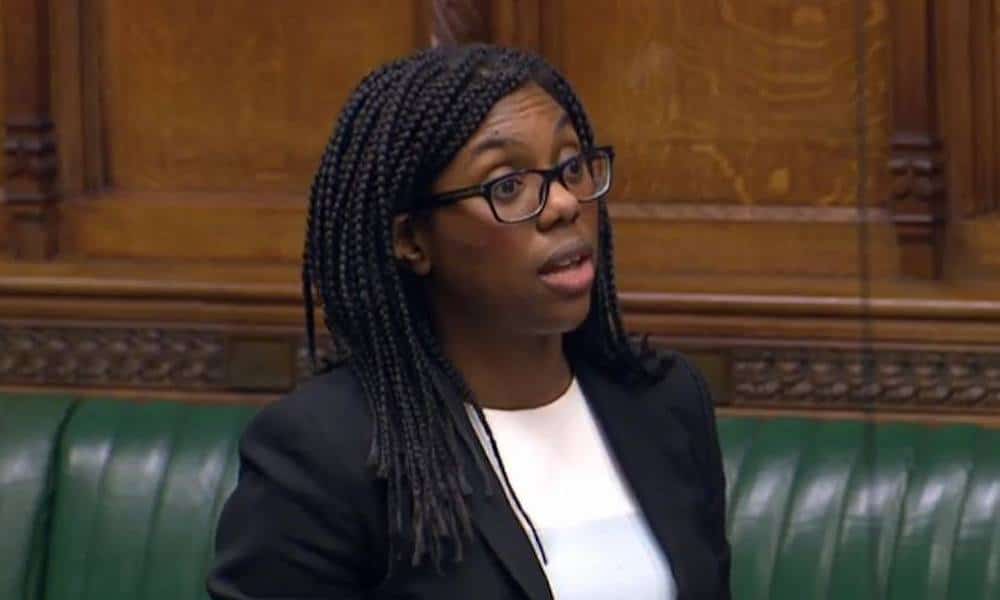
Equalities minister Kemi Badenoch. (Facebook/ Kemi Badenoch MP)
Truss confirmed in August that Kemi Badenoch was in line for a top cabinet role.
Badenoch served as junior equalities minister from 2020 until 6 July when she joined the mass exodus of officials from Johnson’s government. She was condemned for “utterly failing” LGBTQ+ people while in the role.
Kemi Badenoch faced repeated calls for her resignation over the Equalities Office’s delay on vital legislation banning conversion therapy.
In the background, she secretly met with anti-trans lobby group LGB Alliance and allegedly was instrumental in setting up a meeting between government officials and an organisation that advocates for conversion therapy.
Badenoch reportedly skipped a key meeting on Gender Recognition Act reforms, described trans women as “men using women’s bathrooms” in leaked audio and defended anti-trans professor Kathleen Stock.
During her leadership bid, Badenoch positioned herself as “anti-woke”, winning an endorsement from far-right group Britain First.
Nadine Dorries
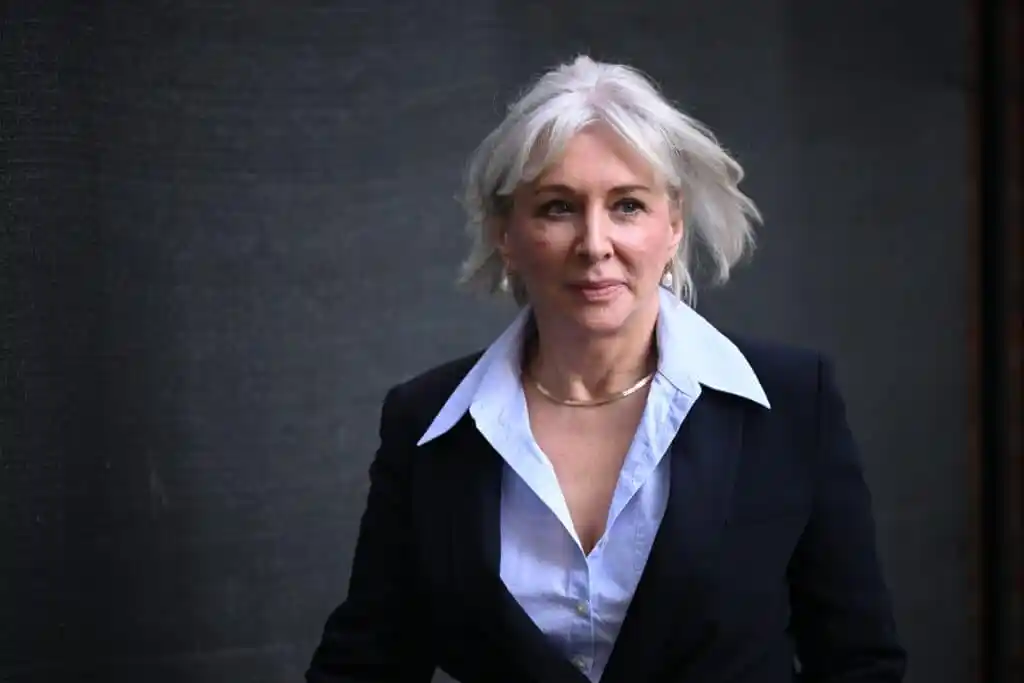
Culture secretary Nadine Dorries has increasingly taken aim at trans rights. (Leon Neal/Getty Images)
There is speculation that Nadine Dorries could remain in her role as secretary for digital, culture, media and sport, primarily so that she can continue her work around reforming the BBC license fee and privatising Channel 4.
This is bad news for the LGBTQ+ community – in particular, trans athletes.
Dorries has been vocal in her support of banning trans athletes from women’s sports, telling British sports bosses that trans women competing alongside cis players is “inherently unfair”.
In June, Dorries told representatives from football, cricket, rugby, tennis, athletics and other sports: “I have made my position absolutely clear: I expect sporting bodies to follow the policy that competitive women’s sport must be reserved for people born of the female sex.”
In 2013, Dorries voted against same-sex marriage and even compared it to incest, asking parliament: “If the gay marriage bill takes sex out of marriage could a sister marry a sister to avoid inheritance tax?”
She labelled the bill “political suicide” and argued that same-sex marriage could never be valid because queer couples couldn’t consummate the union with “ordinary and complete sex”.
In 2021, Dorries called the vote her “biggest regret”. “I will regret it all of my life but truly hope that all same-sex marriages live happily ever after,” she said.
Thérèse Coffey
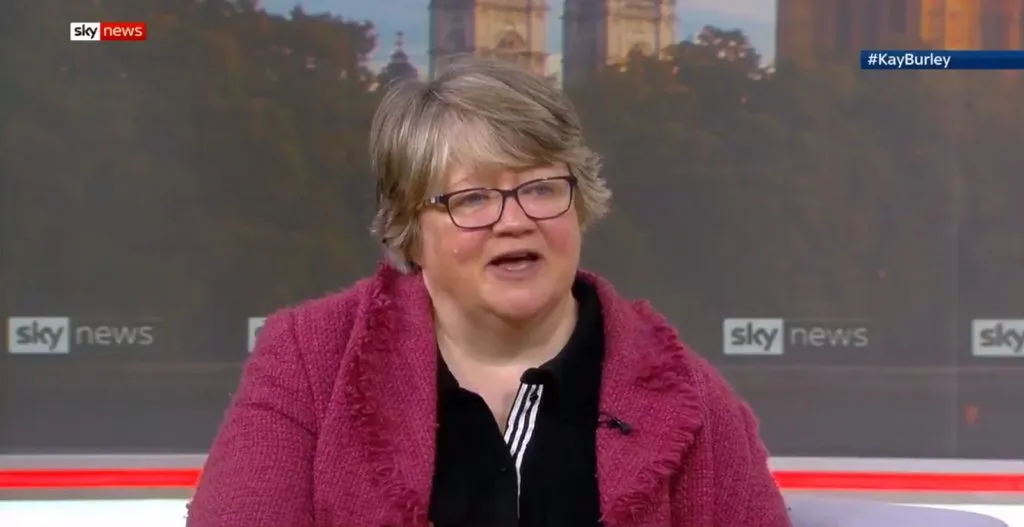
Work and pensions secretary Therese Coffey
Thérèse Coffey has become known for her staunch opposition to same-sex marriage.
She voted against marriage equality in England and Wales 2013 and against in Northern Ireland in 2019.
Explaining her views in 2020, she said: “I took the view at the time, and I still hold to that, I have a strong faith background about what is a legal partnership and what is marriage.”
Kwasi Kwarteng
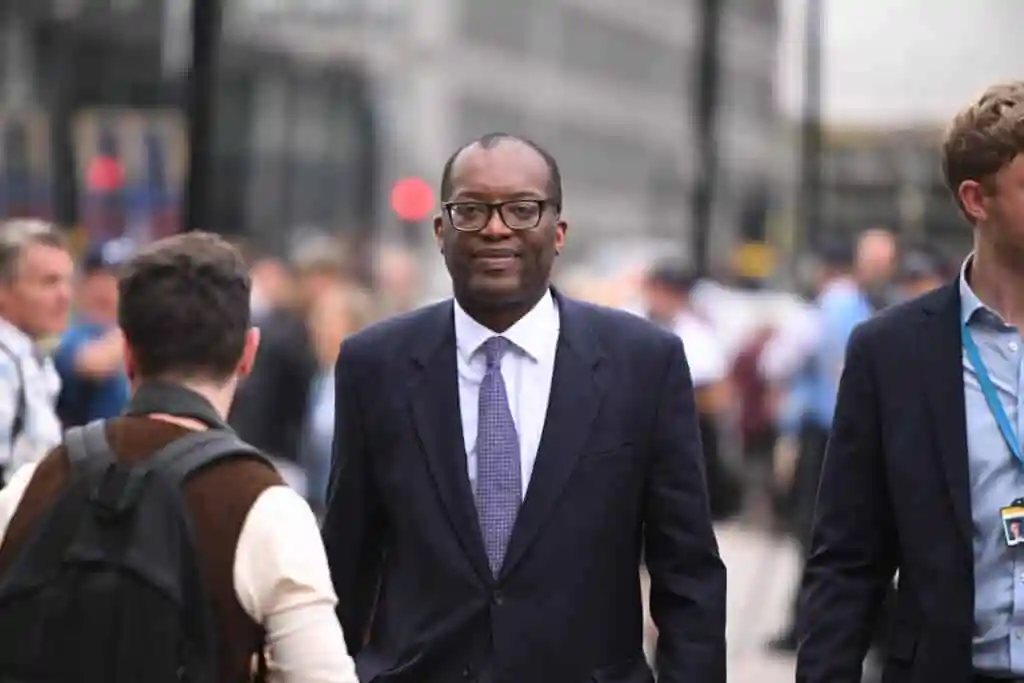
Business secretary Kwasi Kwarteng arrives at CCHQ ahead of the prime minister announcement. (Photo by Leon Neal/Getty Images)
Kwasi Kwarteng, who is expected to take the role of chancellor in the newly formed cabinet, twice voted against same-sex marriage in 2013, and has been absent from all other votes on the subject since.
In 2022 he was criticised for rejecting the idea of inherent sexism in Westminister, a day after Tory MP Neil Parish resigned for watching porn in the Commons.
Kwarteng told Sky News: “I don’t think there’s a culture of misogyny”. He later conceded that while there were some “bad apples”, “that doesn’t mean that the entire culture is extremely misogynistic or full of male entitlement”.
James Cleverly
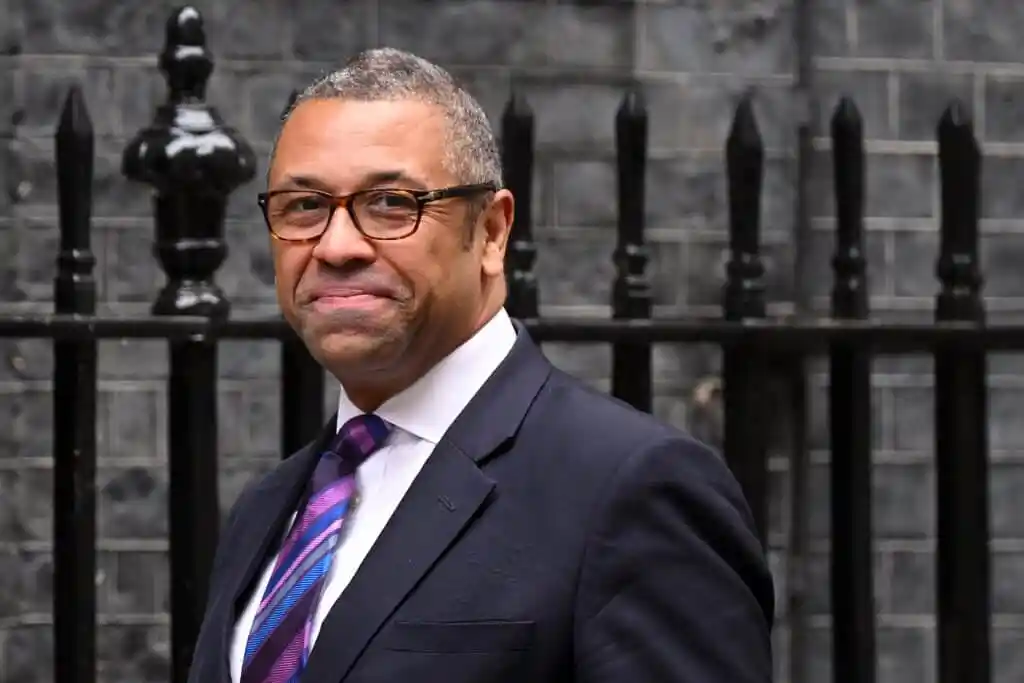
James Cleverly, education secretary, arrives for a Cabinet meeting at 10 Downing Street. (Photo by Leon Neal/Getty Images)
James Cleverly, currently education secretary, could become the new foreign secretary after he backed Truss’ campaign.
Cleverly has never voted on LGBTQ+ rights in parliament but has made statements supporting same-sex marriage, LGBTQ-inclusive education and LGBTQ+ servicepeople.
“There were ‘no’ gay soldiers when I joined the army, yet some of my closest military friends were gay,” he said in 2019.
“Since homosexuality was legalised in the forces we discover that military discipline didn’t collapse and (surprise, surprise) we are still a world class fighting force.”
In a 2005 blog titled “I like marriage”, which he reposed in 2013, he described his views on equality.
“Gay ‘marriage’ takes nothing away from heterosexual marriage and while there will be some civil partnerships which are done for the wrong reasons the same can be said of straight marriage. Best of luck I say,” he wrote.

